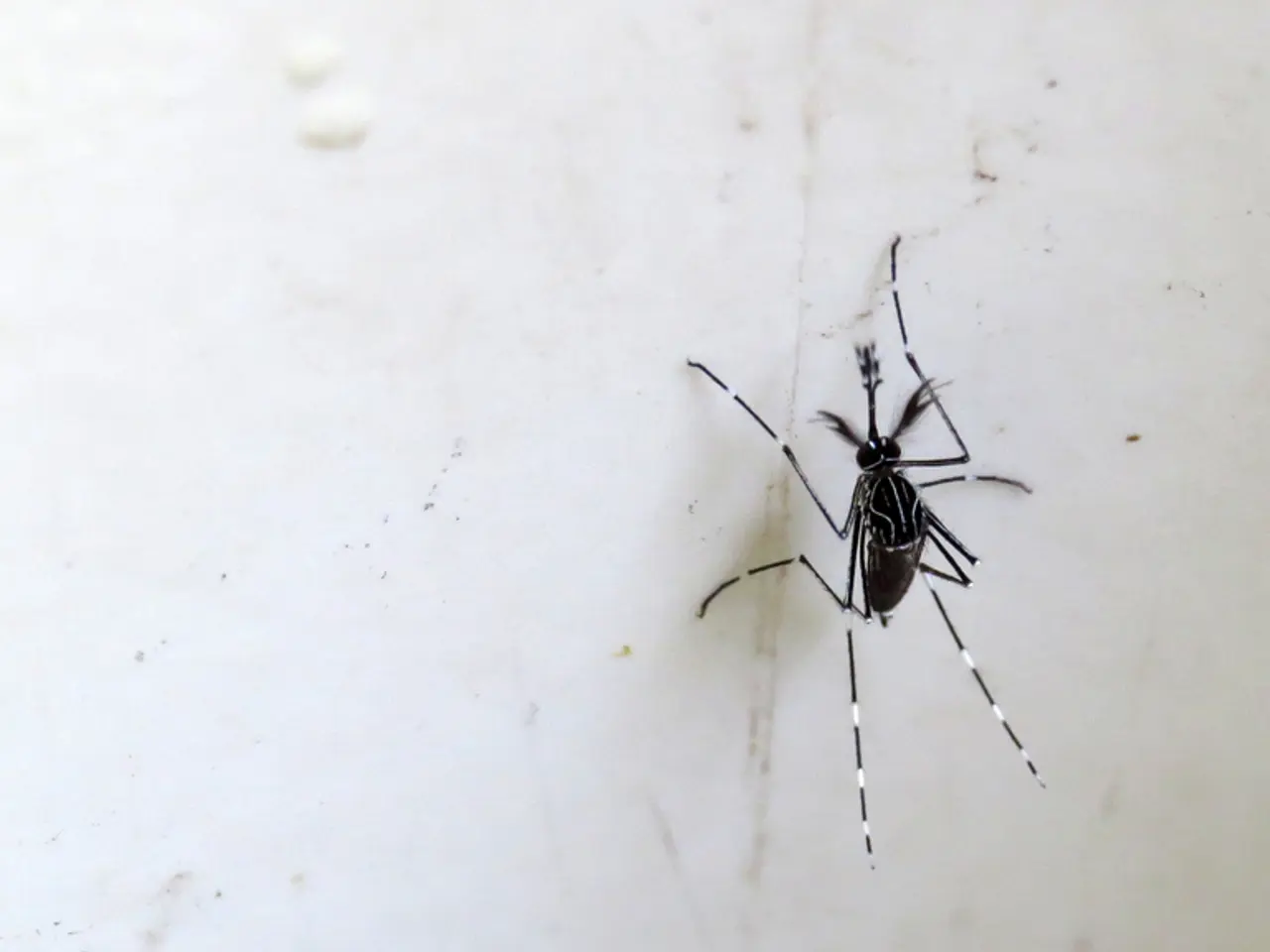Discovered: Harmful Mosquito Species in Pleasanton, Pose Significant Threat
Headline: Aedes Aegypti Mosquito Found in Pleasanton, Alameda County: Public Urged to Take Precautions
In a recent development, the invasive Aedes aegypti mosquito has been detected in Pleasanton, Alameda County. This is the first time since 2014 that this species has been found locally [1][2][5].
The discovery was made near Amador Valley High School, and in response, the Alameda County Mosquito Abatement District has launched a rapid response effort [1][2]. This includes door-to-door inspections, treating storm drains, setting up traps, and speaking with local residents.
The Aedes aegypti mosquito is a significant public health concern due to its ability to spread diseases such as dengue fever, Zika virus, and yellow fever [1][2]. These mosquitoes are aggressive daytime biters and breed in small amounts of standing water often found in common household items [1][2].
Officials recommend that residents take preventive measures to protect themselves and their communities. These include:
- Inspecting and removing standing water around properties to eliminate breeding grounds.
- Using EPA-approved insect repellents and wearing long-sleeve clothing, pants, and socks during peak mosquito activity times.
- Ensuring window and door screens are intact to prevent mosquitoes from entering homes.
Residents are also urged to report sightings of the mosquito to the Alameda County Mosquito Abatement District [1][2]. The public can call (510) 783-7744 or visit www.mosquitoes.org to report mosquito sightings.
The district's activities will continue on Thursday, October 10 [3]. The CDC also recommends using EPA-registered insect repellent, wearing loose, long-sleeved shirts and pants, ensuring screens are in good repair, and removing standing water where mosquitoes lay eggs [4].
It's important to note that Aedes aegypti is not currently established in Alameda County, but it has been detected in four Bay Area counties and is present in 19 California counties [1]. The public is urged to take precautions to help prevent the spread of this mosquito and the diseases it carries.
References: [1] Alameda County Mosquito Abatement District. (2025). Aedes aegypti Mosquito Detected in Pleasanton. Retrieved from https://www.acmosquito.org/news/aedes-aegypti-mosquito-detected-in-pleasanton [2] Contra Costa Health Services. (2025). Aedes aegypti Mosquito Detected in Pleasanton, Alameda County. Retrieved from https://www.cchealth.org/news/aedes-aegypti-mosquito-detected-in-pleasanton-alameda-county [3] Alameda County Mosquito Abatement District. (2025). Mosquito Abatement District Activities Continue on October 10. Retrieved from https://www.acmosquito.org/news/mosquito-abatement-district-activities-continue-on-october-10 [4] Centers for Disease Control and Prevention. (2025). Prevent Mosquito Bites. Retrieved from https://www.cdc.gov/mosquitoes/diseases/dengue/protect-yourself/index.html [5] California Department of Public Health. (2025). Aedes aegypti Mosquito Found in Pleasanton, Alameda County. Retrieved from https://www.cdph.ca.gov/Programs/CID/DCDC/Pages/Aedes-aegypti-Mosquito-Found-in-Pleasanton-Alameda-County.aspx
- Science has made a significant breakthrough in the discovery of the Aedes aegypti mosquito in Pleasanton, Alameda County.
- This mosquito, known for spreading diseases like dengue fever, Zika virus, and yellow fever, was last detected locally in 2014.
- The Alameda County Mosquito Abatement District has launched a rapid response, including door-to-door inspections and setting up traps.
- The mosquito was found near Amador Valley High School, posing a threat to the community's health and wellness.
- Residents are advised to remove standing water around their properties to eliminate breeding grounds.
- Proper use of EPA-approved insect repellents and wearing protective clothing during peak mosquito activity times are also recommended.
- Ensuring window and door screens are intact is crucial to prevent mosquitoes from entering homes.
- The public is encouraged to report sightings of the mosquito to the Alameda County Mosquito Abatement District.
- Aedes aegypti is not currently established in Alameda County, but it has been detected in several Bay Area counties and is present in 19 California counties.
- The first line of defense against this mosquito and the diseases it carries is prevention.
- The CDC recommends using EPA-registered insect repellent, wearing loose, long-sleeved shirts and pants, and ensuring screens are in good repair.
- The Aedes aegypti mosquito is a public health concern due to its impact on chronic diseases and medical conditions.
- In the retail sector, it's crucial to educate consumers about the importance of taking precautions against mosquito-borne illnesses.
- The manufacturing industry should also prioritize workplace wellness by providing information and resources on how to prevent the spread of Aedes aegypti.
- The fight against Aedes aegypti mosquitoes involves various therapies and treatments, including the use of cbd as a potential repellent.
- Nevertheless, climate change poses a threat to our battle against these mosquitoes, as it creates more favorable conditions for them to thrive.
- The association between Aedes aegypti and respiratory conditions is also a growing area of concern in environmental science.
- Digestive health can be affected by the presence of these mosquitoes due to the potential transmission of pathogens.
- Eye-health and hearing are not typically associated with mosquito-borne illnesses, but the risk should not be overlooked.
- The health and wellness of men, women, and children are equally important in this fight, as Aedes aegypti can affect all age groups.
- Fitness and exercise can help strengthen the immune system, making individuals more resistant to diseases spread by Aedes aegypti.
- Sexual health is another aspect of wellness that can be impacted by these mosquitoes, as some diseases they carry can be sexually transmitted.
- Autoimmune disorders can increase a person's vulnerability to mosquito-borne illnesses, highlighting the importance of mental health in disease prevention.
- Aging populations are at a greater risk of developing severe complications from diseases carried by Aedes aegypti, emphasizing the importance of geriatric health care.
- Women's health should also be considered, as pregnancy can lead to increased risk and severity of dengue fever, for example.
- Parenting involves not only caring for children but also ensuring their environment is safe and free from mosquito-borne threats.
- Weight management is essential for overall health, as obesity can weaken the immune system and make individuals more susceptible to these mosquito-borne diseases.




